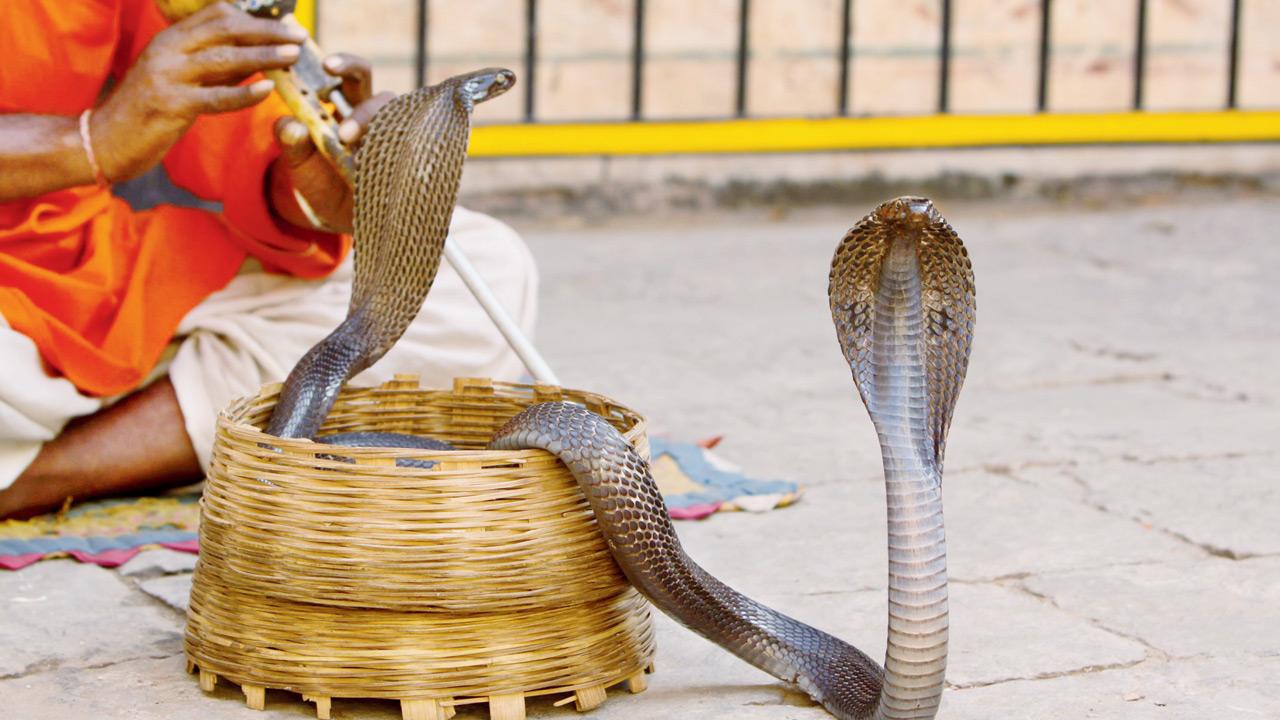
A decision to allow the capture of the Schedule II wild species — the Indian Spectacled Cobra — for Nagpanchami celebrations in Battis Shirala village, Sangli district, has drawn sharp criticism from wildlife conservationists. The Ministry of Environment, Forest and Climate Change (MoEF&CC) granted permission to the Sangli Forest Department to capture 21 male Indian Spectacled Cobras for a five-day period from July 27 to July 31, citing educational purposes.
The Chief Wildlife Warden (CWW) of Maharashtra had sought permission under Section 12 of the Wild Life (Protection) Act, 1972, to capture the snakes from the Shirala Forest Range in Sangli. On July 27, Dr Surabhi Rai, deputy inspector general of Forests (Wildlife) at MoEF&CC, approved the request through a formal letter addressed to the CWW, laying out specific conditions for the activity.
“The selection and identification of specimens shall be done by the chief wildlife warden (CWLW) or an officer authorised by him. The capture, release, and educational activities must take place in the presence of local forest and wildlife officials," stated the letter.
“No commercial use or entertainment of any kind shall be permitted. The CWW must ensure that no injury or harm is caused to the snakes and that there is zero mortality. The snakes should be released safely within the stipulated period,” the letter continued. “Adequate veterinary care must be ensured at every stage, and care should be taken to avoid any post-capture complications. In case of any incident that threatens animal safety, the ministry reserves the right to revoke the permission. The CWW must ensure compliance with all applicable laws and may take further action accordingly,” the letter reads.
Battis Shirala is known for its historical tradition of live snake worship during Nagpanchami, a practice banned since 2006 following a petition by wildlife activists. The topic resurfaced during the Maharashtra Assembly’s monsoon session earlier this month when BJP MLA Satyajit Deshmukh raised a calling attention motion on the matter.
The motion received backing from NCP (Sharad Pawar faction) leader Jayant Patil and BJP MLA Gopichand Padalkar. However, Arjun Khotkar from the Eknath Shinde faction questioned whether the state would approach the Supreme Court to seek a reversal of the ban. Responding to the debate, State Forest Minister Ganesh Naik said he would raise the issue with the Union Forest Minister and request that the Centre allow the revival of these traditional rituals.
Expert Speak
Herpetologist Dr Kedar Bhide said, “This is akin to legalising theft under the pretext of education. It sets a dangerous precedent for other wildlife crimes by showing how they can be legalised. The speed at which the machinery approved this is astonishing, especially when the ministry has yet to act on making snakebites a notifiable disease — a much more urgent issue.”
Wildlife conservationist Kedar Gore, director of the Corbett Foundation, said, “It’s deeply unfortunate that India’s Environment Ministry has allowed the catching, handling, and worshipping of live cobras for the Nagpanchami festival. This is a mockery of the Wildlife (Protection) Act and the Prevention of Cruelty to Animals Act. It’s shameful that Maharashtra’s Forest Minister is supporting a practice the Supreme Court had banned.”
“Live worship severely stresses snakes. Many die after being fed milk. Worship was always meant to be symbolic — to respect snakes’ ecological role and prevent harm to them. This basic understanding has been lost on our leaders. It’s disappointing to see a progressive state like Maharashtra take such regressive steps in the name of tradition.
A wildlife conservationist from Western Maharashtra questioned the motive behind the approval, “The CWW says the permission is to allow traditional Nagpanchami celebrations, but the Ministry of Environment, Forest and Climate Change of India (MoEF&CC) claims it’s for educational purposes. What exactly is educational about catching snakes on Nagpanchami? According to my sources, nearly 2000 snakes have already been captured in Battis Shirala. This completely undermines the Wildlife Protection Act, 1972.”
* This article was originally published here





No comments:
Post a Comment